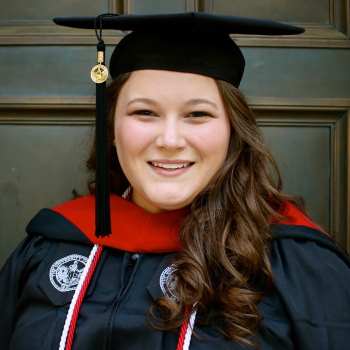Program Overview
Through UA’s online Doctor of Education (EdD) in Special Education, you can prepare to be a leader who transforms the educational landscape for children and youth with exceptional needs. Tailor this program to your interests and career goals by selecting the Autism, Collaborative, Early Childhood Special Education, Gifted or Leadership coursework track.
Online Program Format
72 Credit Hours
$480 Tuition Per Hour
Lead the Future in Special Education
Our online EdD equips you to change the world in special education administration, evaluation, teaching and service in ways that seek the best for students and families with special needs. Graduates may seek career advancement as school or district administrators, teacher trainers or executive leaders in other nonprofit organizations.
Because this degree program may be completed online, it is accommodating of those with full-time careers and other demands. It is possible to complete the program in three years; however, full-time study is not required.
| Application Priority Deadline | March 15 |
| Fees | $10 College of Education graduate fee (per credit hour) |
| Other Program Specifics | Cohort-based program with Fall semester admissions |
| Scholarships and Grants Available | Discover a range of scholarships and grants to support your educational journey |
Curriculum
The EdD in Special Education requires a minimum of 72 credit hours of graduate study beyond the master’s degree, including at least 60 credit hours of coursework and 12 credit hours of dissertation research.
The program can be completed in three years to include summer semesters. Six to nine credit hours per semester would be required to complete the program in three years. The program coordinator will provide you with a program of study. Full-time study is not required, and courses may be taken at your own pace if preferred.
Coursework is a mixture of synchronous and asynchronous classes. Approximately five courses will be held in a synchronous format and will hold virtual sessions. These sessions will be held one night per week (e.g., 5:00 – 8:00 p.m. or 6:00 – 9:00 p.m. Central time).
Required Courses
Special Education and Core Courses (24 hours)
- SPE 593 Introduction to Severe/Profound Disabilities
- SPE 600 Doctoral Seminar in Special Education
- SPE 597 Transition in Special Education
- SPE 606 Topical Seminar in Special Education
- SPE 613 Consultation Process for Special Education Programs
- SPE 616 Advanced Professional Development
- SPE 617 Special Education Leadership, Policy and Law
- BCE 542 Medical and Psychosocial Aspects of Disabilities
Educational Foundations Courses (select 12 hours)
- BEF 534 Multicultural Education
- BEF 577 Readings in Critical Sociology of Education
- BEF 607 Readings in Sociology of Education
- BEF 639 Educational Theory and Policy
- BEF 640 History of Education
- BEF 644 Philosophy of Research in Education
- BEF 667 Multicultural and Social Education for Leadership Personnel
- BEP 500 Advanced Educational Psychology
- BEP 505 Motivation and Self-regulation
- BEP 550 Lifespan Development
- BEP 561 Sociocultural Basis of Behavior
- BCE 513 Career Development
- BCE 522 Individual and Group Appraisal
- BCE 653 Introduction to Play Therapy
- CAT 531 Computer Based Instruction
- Or any BCE, BEF, BEP, or other advisor-approved non-SPE course offered online
Educational Research Courses (select 12 hours)
- BER 540 Statistical Methods in Education
- BER 555 Measurement and Evaluation: Social and Behavioral
- BER 600 Quantitative Research Methods
- BER 660 Evaluation I: Theory and Practice
- Or other advisor-approved BER course
Coursework Tracks*
Autism Track (select four courses)
- SPE 502 Advanced Behavior Management
- SPE 504 Introduction to Assistive Technology
- SPE 520 Language, Communication and Early Literacy Interventions
- SPE 531 Introduction to Autism Spectrum Disorder
- SPE 532 Evidence Based Practices in Autism Spectrum Disorder
- SPE 533 Assessing Behavior Change in Children and Youth with Autism
- SPE 611 Independent Study
Collaborative Special Education Track (select four courses)
- SPE 590 Introduction to Mild Disabilities
- SPE 602 Seminar in Research in Special Education
- SPE 611 Independent Study
- SPE 623 Issues in Collaborative Education
- SPE 624 Advanced Curriculum Workshop: Collaborative
Early Childhood Special Education Track (select four courses)
- SPE 572 Early Childhood Development
- SPE 578 Methods of Teaching Young Children with Disabilities
- SPE 602 Seminar in Research in Special Education
- SPE 611 Independent Study
- SPE 621 Issues in Special Education: Early Childhood
- SPE 622 Advanced Curriculum Development: Early Childhood
Gifted Education Track (select four courses)
- SPE 581 Psychology of Gifted and Talented Youth
- SPE 582 Teaching Gifted Education
- SPE 583 Creative Problem Solving
- SPE 584 Special populations of Gifted
- SPE 585 Teaching Thinking Skills
- SPE 611 Independent Study
- SPE 681 Issues in Gifted Education
Leadership in Special Education Track (select four courses)
- AEL 608 Educational Finance Theory and Practice
- AEL 619 Politics in Education
- AEL 630 School and Community Partnership
- AEL 650 Organizational Theory
- AEL 661 Trends and Major Issues in Educational Leadership
- AEL 664 Educational Policy and the Dynamics of Change
- AEL 671 Survey of Instructional Supervision
- AEL 682 Leadership and Organization Theory with Applications
- SPE 611 Independent Study
*Choose from one coursework track. Each track totals to 12 hours.
Admission
Admission to the Doctor of Education in Special Education program is highly selective and requires the following:
- A master’s degree in special education or a related area.
- Please note that an EdS degree or other post-master’s degree work (i.e., BCBA) will make an applicant more competitive for admission. If you do not have an EdS or other post-master’s degree work, you may want to consider applying to our online EdS program first. Much of the EdS coursework overlaps with the EdD program, enabling a seamless, internal transfer of hours: https://online.ua.edu/degrees/eds-in-special-education.
- Three years of appropriate experience, defined as three years of teaching experience (accompanied by teaching certification)
- Transcripts from all institutions attended
- Statement of purpose
- Completed UA Graduate School application
- An interview may be required by the department. Applicants will receive additional information from the program coordinator if they are invited to interview.
- Three letters of recommendation
- Applicants may be considered for regular admission to a graduate program when they meet the minimum GPA requirement set by the Graduate School: an overall undergraduate GPA of 3.0 or higher on a 4.0 scale, or a 3.0 average for the last 60 credit hours in a degree program, or a 3.0 or higher GPA in a completed graduate degree program
- Writing Assessment: Please submit as one document.
- Part 1: In one page, please describe what is meant by evidence-based practices.
- Part 2: In three to five pages, please list some of these evidence-based practices and describe their role in contemporary gifted education or special education (select the area of program application). Please also discuss why you think there is a gap in implementing these practices.
A committee of graduate faculty members evaluate and collectively discuss admission applications as designated by the chair of the department.
This program does not lead to certification or licensure in special education.


Student Spotlight
Inspiring stories of success from students and alumni.
Take a look at some of our UA Online stories.
Contact Us
Program Information
Hannah Homan
Admissions Representative 800-467-0227
hannahh.bama@ua.edu
Admissions Information
UA Online
800-467-0227
online@ua.edu










